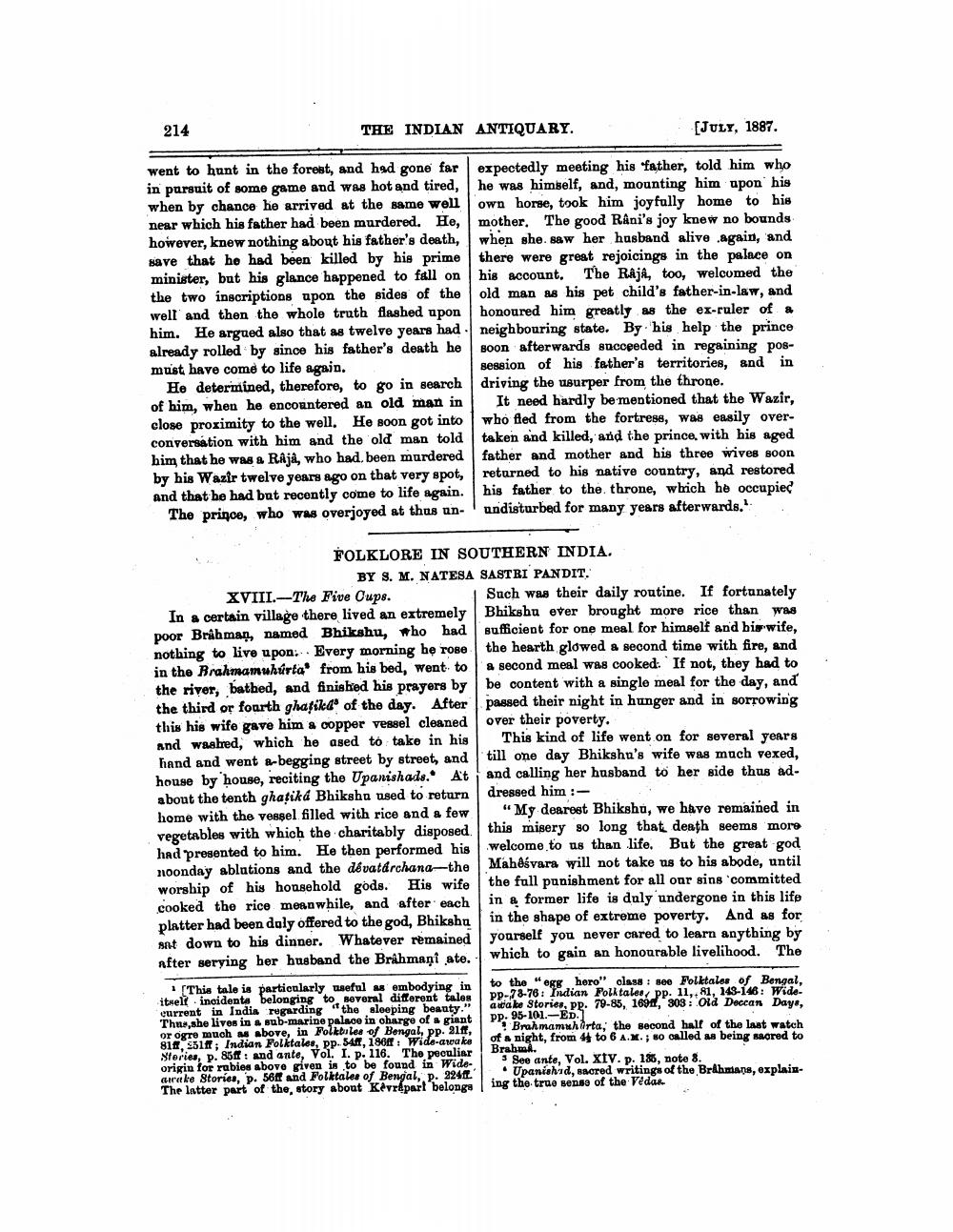________________
214
THE INDIAN ANTIQUARY.
[JULY, 1887.
went to hunt in the forest, and had gone far expectedly meeting his father, told him who in parsuit of some game and was hot and tired, he was himself, and, mounting him upon his when by chance he arrived at the same well own horse, took him joyfully home to his near which his father had been murdered. He, mother. The good Rani's joy knew no bounds however, knew nothing about his father's death, when she saw her husband alive again, and save that he had been killed by his prime there were great rejoicings in the palace on minister, but his glance happened to fall on his account. The RÂjA, too, welcomed the the two inscriptions upon the sides of the old man as his pet child's father-in-law, and well and then the whole truth flashed upon honoured him greatly as the ex-ruler of a him. He argued also that as twelve years had neighbouring state. By his help the prince already rolled by since his father's death he soon afterwards succeeded in regaining posmust have come to life again.
session of his father's territories, and in He determined, therefore, to go in search driving the usurper from the throne. of him, when he encountered an old man in It need hardly be mentioned that the Wazir, close proximity to the well. He soon got into who fled from the fortress, was easily overconversation with him and the old man told taken and killed, and the prince with his aged him that he was a RAjd, who had been murdered father and mother and his three wives soon by his Wazir twelve years ago on that very spot, returned to his native country, and restored and that he had but recently come to life again. his father to the throne, which he occupiec
The prince, who was overjoyed at thus an- andisturbed for many years afterwards.
FOLKLORE IN SOUTHERN INDIA.
BY S. M. NATESA SASTRI PANDIT. XVIII.-The Five Cups.
Such was their daily routine. If fortunately In a certain village there lived an extremely Bhikshu ever brought more rice than was poor Brihman, named Bhikshu, who had sufficient for one meal for himself and his wife, nothing to live upon. Every morning he rose the hearth glowed a second time with fire, and in the Brahmamuhúrta' from his bed, went to a second meal was cooked. If not, they had to the river, bathed, and finished his prayers by be content with a single meal for the day, and the third or fourth ghafikdo of the day. Afterpassed their night in hunger and in sorrowing this his wifo gave him a copper vessel cleaned over their poverty. and washred, which he ased to take in his This kind of life went on for several years hand and went a-begging street by street, and till one day Bhikshu's wife was much vexed, house by house, reciting the Upanishads. At and calling her husband to her side thus ad about the tenth ghatika Bhiksha used to return dressed him :home with the vessel filled with rice and a few "My dearest Bhikshu, we have remained in vegetables with which the charitably disposed this misery so long that death seems more had presented to him. He then performed his welcome to us than life. But the great god noonday ablutions and the dévatárchana-the Mahdśvara will not take us to his abode, until worship of his household gods. His wife the full punishment for all our sins 'committed cooked the rice meanwhile, and after each in a former life is duly undergone in this life platter had been duly offered to the god, Bhikshu in the shape of extreme poverty. And as for sat down to his dinner. Whatever remained yourself you never cared to learn anything by After serying her husband the Brihmani ate. which to gain an honourable livelihood. The
1 (Thin tale in particularly useful as embodying into the "ogs hero" class : see Folktales of Bengal, itxell incidents belonging to several different tales PP-78-78: Indian Folktale. pp. 11, 81, 143-146: Wide current in India regarding the sleeping beauty." awake Stories, PR. 79-85, 16911, 303 oia Deccan Daya, Thus,she lives in a sub-marine palace in charge of giant
pp. 95-101.- ED.) or ogre much above, in Folkbilea of Bengal, pp. 211,
Brahmamuhita, the second half of the last watch 818 55111; Indian Folktales, pp. 5411, 1801 Wide-anaké of night, from 1 to 6 A.X. so called as being sacred to Stories, p. 868: and ante, Vol. I. p. 116. The peculiar Brahma. origin for rabies above given is to be found in Wide- See ante, Vol. xIv. p. 186, note 8. Gratke Stories, p. 56t and Folktaler of Bengal, p. 224. 1. Upanishad, snored writings of the Brahmane, explainThe latter part of the story about Kérrépart belongs ing the true sense of the Vedas




